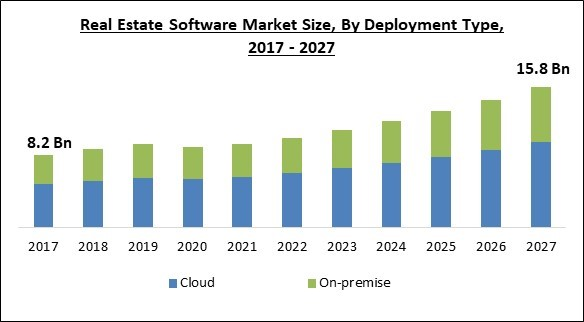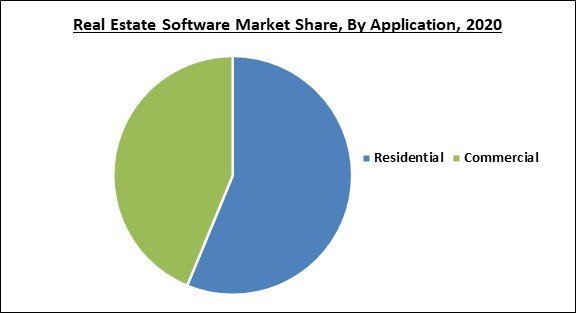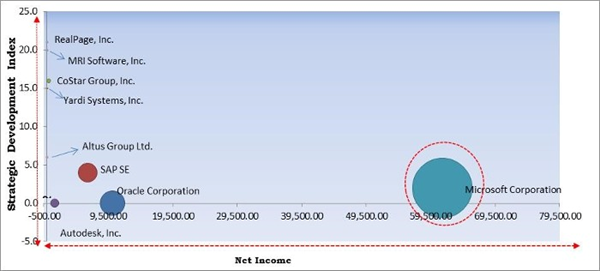The real estate software is designed to help in managing relationships between sellers, agents, brokers, developers, financial institutions, and buyers to fulfill multiple needs of real estate firms & real estate agents. The role of real estate software is to manage the requests to prepare price quotes. Also, the real estate software manages end to end process for real agencies from selling commercial real estate to property management.
Major providers of real estate software are adopting advanced technologies in order to provide more relevant products fulfilling the requirements of consumers. Various vendors are adopting Virtual Reality (VR) to save resources & time and expand the reach of long distance buyers & improve user engagement. In addition, machine learning (ML), and artificial intelligence (AI) enables businesses to automate time consuming tasks which results in increased return on investments (ROI).
COVID-19 Impact Analysis
The widespread of the COVID-19 pandemic has affected the world brutally. Various restrictions over movement of goods & people along with complete lockdown imposed by the government of many countries in order to curb the effect of the novel coronavirus affected all the industries in one or other manner. The real estate industry is negatively impacted during the pandemic. The discontinuance of construction activities all over the world resulted in a decline in demand for real estate software in the market.
Whereas, the market is anticipated to get back on the growth track post pandemic because of the rising demand for digitalization of the records & data of existing customers that may help the business organizations about the purchasing behaviour of customers. Also, the growing population and urbanization resulting in increased development of infrastructure with the smart solution are expected to contribute in the growth of the real estate software market post pandemic.
Market Growth Factors:
Create Integrated Marketing Solutions
The real estate software serves with some marketing capabilities to support automation & email interaction. Also, the real estate software such as CRM when combined with the compatible market solution may improve the sales and marketing potential of business organizations. Various features of the CRM software help in building a much better customer profile. Moreover, insights on web activities, email campaign &social media interactions and other platforms where the real estate industry works are fed back at the real estate software, wherein users can analyze which channel is giving best results. In addition, the automated lead scoring feature of this type of software helps in prioritizing the sale. Easy access to the data at single platform collected from various resources help the organization to get better results.
Better Data security
The real estate industry deals with a lot of personal data which is required to be kept secured as to ensure the safety of client’s information specially when the data is hosted at the cloud. This is because any unauthorized user can use the data leading to major losses for organization. The real estate software provides the feature of digital security. The customer relationship management (CRM) software provide role-based security that sets privileges for specific type of users, and record-based security which restricts the access of confidential information by unauthorized users. The cloud-based software providers are also adding external security features.
Marketing Restraining Factor:
High Cost
The main disadvantage of the real estate software is the cost attached to it. The real estate software is expected to increase the IT budget. The adoption of real estate solution requires hardware and improved network infrastructure. Also, the organization is required to spend on the purchase of software, and house IT team for managing and monitoring the software. This is expected to require a lot of money to be spent.
In addition, the more adoption of web-based CRM software is resulting in high cost of licensing contracts for its use. Along with this, the organizations using real estate software are required to train their workers to get the benefits associated with the use of these types of software which also arises the need to spend a lot in terms of money.
Deployment Type Outlook
Based on Deployment Type, the market is segmented into Cloud and On-premise. the on-premise segment acquired a substantial revenue share in the real estate software market. This software is hosted on a particular device and gives user complete ownership due to which, it is gaining immense popularity among the organizations who wanted to store their data locally.
Type Outlook
Based on Type, the market is segmented into Customer Relationship Management Software, Enterprise Resource Planning Software, Property Management Software, Contract Software, and Others. The enterprise resource planning software procured a significant revenue share in the real estate software market in 2020. The major factors driving the growth of enterprise resource planning software is the cost effectiveness offered by this type of software along with enhanced visibility and efficiency resulting in high adoption of ERP software.
Application Outlook
Based on Application, the market is segmented into Residential and Commercial. In 2020, the residential segment garnered the highest revenue share in the real estate software market. The increasing preference of homeownership & rising prices of residential property are resulting in high demand for purchasing self-owned property. Also, the building with modern infrastructure is increasing which is resulting in growth of real estate industry and further growing the demand for real estate software as well.
End Use Outlook
Based on End-use, the market is segmented into Architects & Engineers, Real Estate Agents, Project Managers, and Others. In 2020, the architects and engineers segment recorded the highest revenue share in the real estate software market in 2020. The increasing demands for residential as well as spaces is forcing the architects & engineers to spend more time in developing feasibility reports & new projects. This is rising the usage of real estate software by architects & engineers for quick generation of reports enabling them to core tasks.
Regional Outlook
Based on Regions, the market is segmented into North America, Europe, Asia Pacific, and Latin America, Middle East & Africa. The Asia Pacific region garnered a significant revenue share in 2020. This is due of presence of various developing countries in the region such as Japan, China, India and other Asian countries. Increased cooperation between the technological firms & real estate industry is rising the adoption of such big data, cloud computing and Internet of Things solutions in China is leading to the high demand for real estate software in Asia Pacific.
Cardinal Matrix - Real Estate Software Market Competition Analysis
The major strategies followed by the market participants are Product Launches. Based on the Analysis presented in the Cardinal matrix; Microsoft Corporation is the forerunners in the Real Estate Software Market. Companies such as CoStar Group, Inc., SAP SE, Altus Group Ltd. are some of the key innovators in the Market.
The market research report covers the analysis of key stake holders of the market. Key companies profiled in the report include SAP SE, Autodesk, Inc., Oracle Corporation, Microsoft Corporation, Altus Group Limited, CoStar Group, Inc., MRI Software LLC, RealPage, Inc., and Yardi Systems, Inc.
Recent Strategy Deployed in Real Estate Software Market
Partnerships, Collaborations and Agreements:
- Oct-2021: MRI Software entered into a partnership with Bottomline, a leading provider of financial technology. The partnership aimed to allow real estate companies to use one platform for all their accounts payable & payment automation requirements for B2B, B2C, domestic and international.
- Jun-2021: RealPage entered into a partnership with Airbnb, an American company that operates an online marketplace for lodging, primarily homestays for vacation rentals, and tourism activities. The partnership aimed to make home sharing easier for residents and apartment owners by introducing its apartment home sharing solution Migo.
- May-2021: SAP partnered with Honeywell, an American publicly traded, multinational conglomerate corporation. This partnership focused on providing consumers with the latest visibility into the performance of their real estate portfolio and helping operators in making better real estate decisions by unifying IT data, OT data & occupant information.
- Apr-2021: MRI Software extended its partnership with Savills, a global real estate services provider listed on the London Stock Exchange. This expanded partnership is expected to automate & simplify the complex data extraction process to allow Savills' clients for easy access and analyze data from leases, contracts & legal documents.
- Mar-2021: Yardi Systems join hands with Altus Group, a leading provider of software, data solutions & independent advisory services. From this collaboration, the company aimed to provide a seamless flow of data between Altus Group’s cloud-enabled ARGUS Enterprise (“AE”) and Yardi Voyager by launching Altus Group’s ARGUS Connector for Yardi Voyager.
- Oct-2020: SAP SE teamed up with Wipro, a leading global information technology, consulting & business process Services Company. The collaboration aimed to help real estate businesses constantly innovate & differentiate themselves in the marketplace and help consumers solve real-world business challenges. In addition, the company is expected to further continue designing solutions for other industries also.
- Jul-2020: Microsoft Corporation joined hands with Samsung Electronics, a South Korean multinational electronics corporation. The collaboration focused on the digital transformation of the real estate development & property management industries. The companies aimed to help in driving the enhanced building operations & maintenance as well as creating better experiences for service technicians as well as residents by combining smart appliances & digital cloud technologies.
Product Launches and Product Expansions:
- Jul-2021: Yardi unveiled Yardi Corom, a cloud-based software solution designed for commercial tenants. This solution is expected to provide a single platform solution for occupancy tracking, lease management, and desk hoteling for flexible workplaces. Moreover, Yardi Corom is expected to offer management for facility maintenance, transactions, and capital projects.
- Feb-2020: Altus Group introduced Altus Data Studio, a new data analytics platform. The platform is expected to provide a deeper insight into the Canadian real estate market with new analytical capabilities. The Altus Data Studio provides the company's Canadian data clients with improved ability to better analyze, search & gain insights based on market-leading real estate data.
Acquisitions and Mergers:
- Dec-2021: RealPage announced the acquisition of HomeWiseDocs, a leading provider of data and document delivery services. The acquisition allowed the company to more quickly scale for delivering more value to the industry for a broad range of products that is expected to help property managers to enhance their operations and be more profitable.
- Dec-2021: Yardi took over 42Floors.com, a well-known online marketing platform for tenants & brokers. From the acquisition, the company aimed to provide more depth of data & high-return avenues of visibility for CommercialEdge clients to market & drive their business.
- Nov-2021: MRI Software completed the acquisition of eSight Energy Limited, a UK-based software development company. This acquisition aimed to improve the company's comprehensive facilities & real estate management capabilities by adding energy monitoring solutions that is expected to reduce operating costs, environmental impact, improve facility performance as well as help to match legislative & compliance standards.
- Oct-2021: CoStar Group took over COMREAL INFO, the owner & operator of BureauxLocaux.com, a commercial property digital marketplace. The acquisition aimed to support the company's ongoing international expansion.
- Sep-2021: MRI Software acquired Box+Dice, industry-leading customer relationship management (CRM) solution provider. The acquisition aimed to add value to the company's PropTech portfolio that allows real estate businesses to unify consumer lifecycle visibility across sales as well as rental property management.
- Aug-2021: MRI Software acquired FSI, a UK-based provider of enterprise-class facilities management (FM) software solutions. The acquisition aimed to support the company's overall portfolio as well as improve its ability to better serve owners, occupiers & contractors through delivering cutting-edge technology to effectively manage & maintain their facilities.
- Aug-2021: RealPage took over G5 Search Marketing, a leading pure-play provider of digital marketing, advertising & analytics solutions. The company aimed to accelerate the company’s vision for marketing optimization & ultimately a better renter experience for its consumers by combining G5’s industry-leading solutions with the company's end-to-end real estate platform.
- May-2021: CoStar Group acquired Homes.com, the fifth-largest real estate portal by traffic market share. From this acquisition, the company aimed to offer the best online home buying experience possible by frictionlessly connecting agents, buyers, and sellers through combining Homes.com and Homesnap.
- Apr-2021: MRI Software took over Manhattan, the real estate and workplace solutions business of Trimble. This is expected to support the company's workplace management offering by robust space scheduling, facilities management, and booking capabilities, adding value to its comprehensive lease accounting & administration solutions for commercial real estate operators, owners & occupiers across the globe.
- Dec-2020: Yardi completed the acquisition of CommissionTrac, an Atlanta-based software company providing revenue management software for commercial real estate companies. The acquisition focused on commercial brokerages by developing a strong product that perfectly complements the CommercialEdge suite, a Yardi’s suite of products mainly the marketing & deal management products.
- Dec-2020: CoStar Group took over Homesnap, an industry-leading provider of technology solutions to the real estate industry. This acquisition aimed to provide significant complementary value to the company's existing arsenal of broker & agent-centric tools, directly benefiting the entire industry.
Scope of the Study
Market Segments Covered in the Report:
By Deployment Type
- Cloud
- On-premise
By Type
- Customer Relationship Management Software
- Enterprise Resource Planning Software
- Property Management Software
- Contract Software
- Others
By Application
- Residential
- Commercial
By End-use
- Architects & Engineers
- Real Estate Agents
- Project Managers
- Others
By Geography
- North America
- US
- Canada
- Mexico
- Rest of North America
- Europe
- Germany
- UK
- France
- Russia
- Spain
- Italy
- Rest of Europe
- Asia Pacific
- China
- Japan
- India
- South Korea
- Singapore
- Malaysia
- Rest of Asia Pacific
- LAMEA
- Brazil
- Argentina
- UAE
- Saudi Arabia
- South Africa
- Nigeria
- Rest of LAMEA
Key Market Players
List of Companies Profiled in the Report:
- SAP SE
- Autodesk, Inc.
- Oracle Corporation
- Microsoft Corporation
- Altus Group Limited
- CoStar Group, Inc.
- MRI Software LLC
- RealPage, Inc.
- Yardi Systems, Inc.
Unique Offerings from the Publisher
- Exhaustive coverage
- The highest number of market tables and figures
- Subscription-based model available
- Guaranteed best price
- Assured post sales research support with 10% customization free
Table of Contents
Companies Mentioned
- SAP SE
- Autodesk, Inc.
- Oracle Corporation
- Microsoft Corporation
- Altus Group Limited
- CoStar Group, Inc.
- MRI Software LLC
- RealPage, Inc.
- Yardi Systems, Inc.











